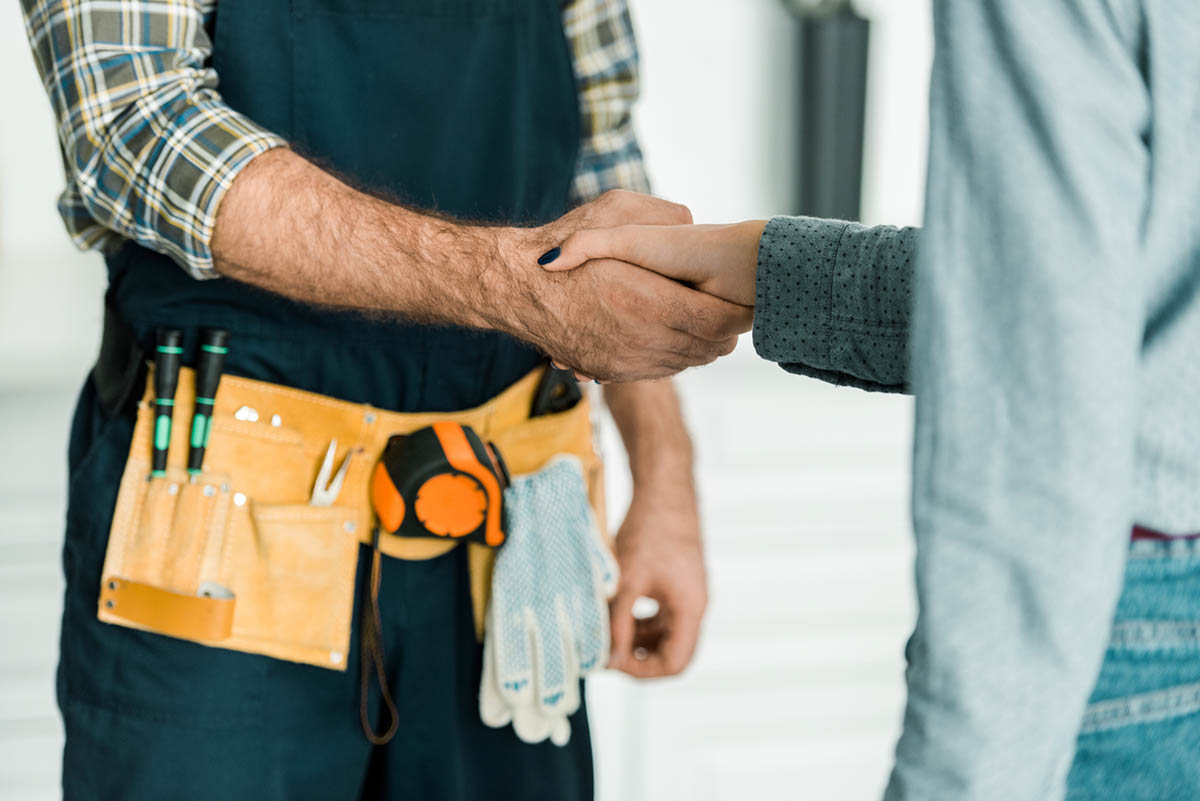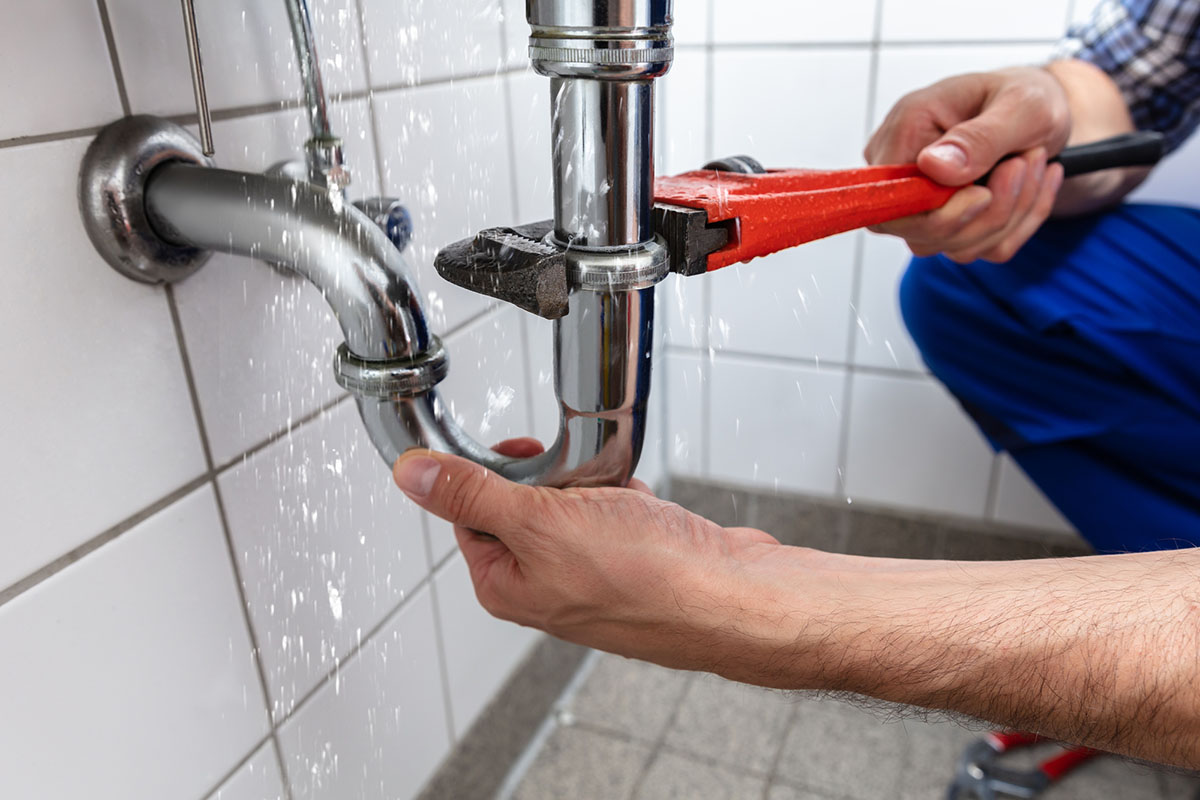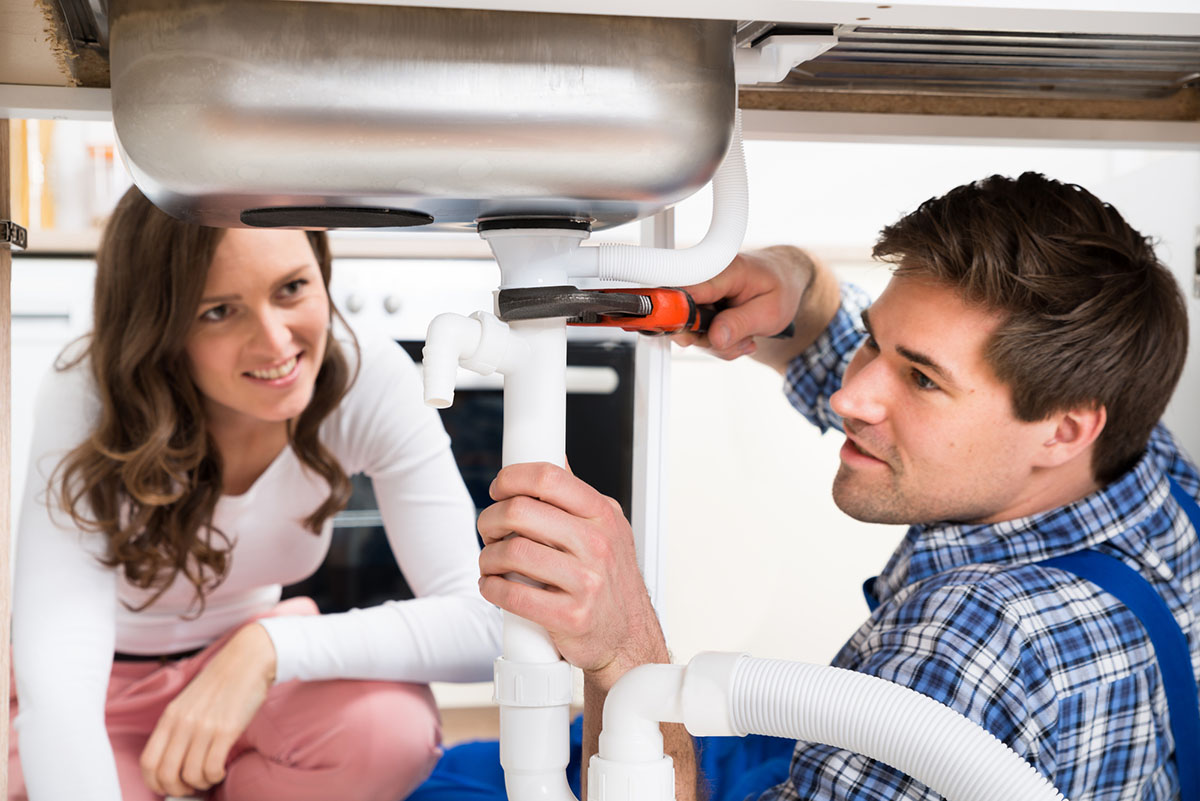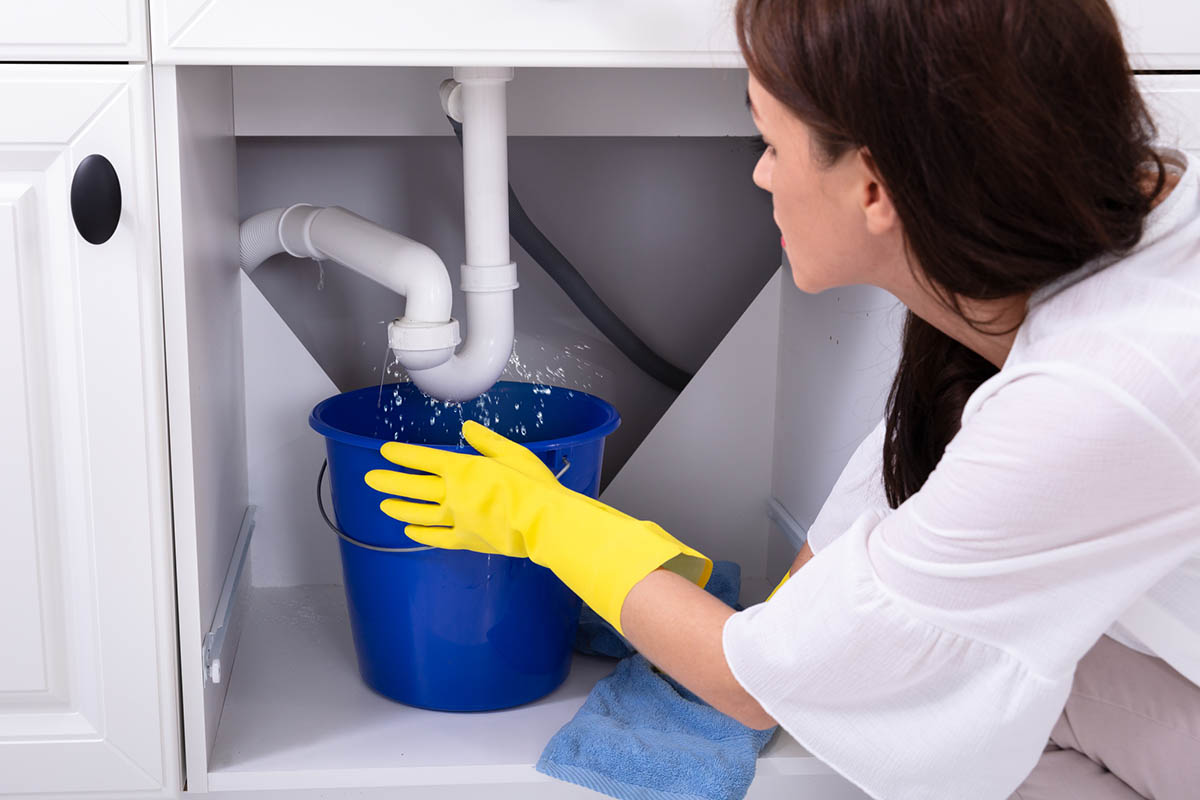

We may earn revenue from the products available on this page and participate in affiliate programs. Learn More ›
Hiring the Best Plumber Near Me
Whether facing a plumbing emergency or a home bathroom remodel, many homeowners turn to a professional plumber for help. Some professional plumbers specialize in providing emergency services, while others work as remodeling plumbers for home improvement projects.
If you don’t already know a trusted local plumber, you may be wondering: how can I find a reputable plumber near me? Here’s what you need to know about hiring a plumber that meets your needs.
Cost of a Plumber Near Me

A plumber’s rates typically range from $45 to $200 per hour, though they may instead charge flat rates for basic service calls. On average, a single project’s total cost can range between $173 and $459, with an average repair cost of $316. Plumbers may also charge extra for travel time, supplies, and after-hours or emergency jobs. Overall rates will vary by the type and complexity of the job, the geographic location, and the skill level of a professional. Simple jobs that can be finished by apprentices will generally cost less than more complex jobs that require the expertise of a master plumber.
If a plumber is needed in the event of an emergency, on a holiday or weekend, or after-hours, you can generally expect to pay more than you would pay for work done during the individual’s working hours. Plumbers will charge anywhere from time-and-a-half to triple their hourly rate for jobs done outside their working hours, depending on their individual policies and practices.
Regardless of the plumbing issue you face, it’s advised to always get a quote in writing before agreeing to hire a professional.

Common Issues a Plumber Near Me Can Fix
A plumbing professional can install, assess, and repair systems used for water, sewage, and drainage. Common problems include:
- Clogs: Low water pressure, slow drainage, or a lack of running water can signify clogs in a home’s plumbing systems.
- Toilet issues: Toilets that gurgle, run constantly, or experience frequent clogs may have an underlying issue. A plumber can assess whether the toilet needs a replacement part or if there is a blockage that needs to be repaired.
- Plumbing for renovations: Remodeled kitchens and bathrooms often require plumbing installation. It’s best to call in a professional for these projects to ensure that everything is up-to-code.
Anything related to a home’s water, sewage, and drainage would fall under a plumber’s scope of practice. Home repairs outside this purview would typically be addressed by another professional, such as a general contractor or an electrician.

Do I Need a Plumber?
Before hiring a plumber, it’s important to determine whether you actually need one for the task at hand. Certain emergency and non-emergency situations will necessitate a professional, while others may not require a plumber’s specific expertise. In addition to the task at hand, there are other factors to consider to determine whether a plumber is needed.
Emergencies
Certain plumbing issues should be addressed by a professional immediately to limit further damage to the home:
- Flooding (or risk of flooding). A failed sump pump or burst pipe can all lead to flooding. Flood damage can significantly damage the home and is a safety hazard.
- Sewer backup. A backed sewer line means sewage is sitting at its backup point. This not only creates a health hazard, but prevents homeowners from running water until it is repaired. Signs of a sewage backup include foul odors emanating from the drain and slowed drainage throughout the home.
- No running water. A lack of running water poses significant logistical challenges and safety concerns for homeowners. If water isn’t running, this could indicate a leak or a frozen pipe.
Non-Emergencies
Even if a plumbing issue is not an emergency, it should still be addressed to prevent further damage or issues from occurring. For these non-emergency situations, it’s best to schedule an appointment in advance with a local plumber:
- Toilet issues. Frequent clogs and constantly-running water often indicate underlying issues with the plumbing or the toilet itself.
- High or low water pressure. If the water pressure in the shower suddenly drops, it could signify a clog in the pipes. Conversely, rattling pipes or “water hammer” are often caused by excessively high water pressure.
- Minor visible or suspected leaks. Brown spots on the ceiling, peeling paint or mold, or an unexplained spike in the water bill can all signify a leak.
Other Considerations
Before calling a plumber, consider the urgency of the task at hand. Emergency jobs often come at an additional cost, but if safety and home integrity are at risk, it’s worthwhile to call a plumber. Otherwise, the job can be scheduled in advance.
Finally, the best way to prevent a plumbing emergency is to conduct regular maintenance. In addition to monitoring for leaks or slow drainage, scheduling inspections throughout the year can help solve problems before they arise.

DIY vs. Hiring a Professional Plumber
To save money, handy homeowners may consider taking the DIY approach to plumbing repairs. While some jobs are indeed easy to address by the average homeowner, it’s important to consider the potential for water damage if you run into issues or make a mistake during your DIY repair.
For basic issues, such as a slow drain or a running toilet, homeowners can typically tackle these with off-the-shelf repair kits. However, more complicated issues or plumbing emergencies can only be made worse if they aren’t addressed by a professional.
Additionally, home renovation projects are best left to a professional. Even if a homeowner has a basic working knowledge of plumbing, many municipalities prefer to see a licensed plumber who knows the local building codes on the permit application for jobs like bathroom or kitchen renovations. To avoid any issues with permits and inspections (or any errors with parts and installation), it’s often wise and worth the investment to contract a professional local plumber.
In general, if the project is outside your skill level or if you are unable to devote the necessary time to it, it’s best to call in a pro.
How to Find a Reputable Plumber Near Me
In an emergency, it can be tempting to enter “plumber near me” in a search engine and call the first name on the list. However, taking the time to do the necessary research can help you find a qualified plumber whose services meet your needs. Here are some tips on finding a reputable local plumber:
- Determine the needs of the job, then look for plumbers who offer those services. Plumbers may specialize in installation, repair, and maintenance, as well as renovation or emergency services.
- Use your network. Friends, neighbors, and local review sites can be a great resource to find quality local plumbers. If a name or company comes highly recommended or crops up multiple times, it’s likely that they are a reputable choice.
- If possible, find a plumber before an emergency strikes. Consider connecting with a professional for non-emergency repairs and routine maintenance. They may be able to provide emergency services or connect you with a fellow plumber who can. This can prevent hasty decision-making and ensure you’re satisfied with the work completed.

Questions to Ask Your Local Plumber
When working with your local plumber, asking the right questions can ensure you get the results you want. Here are some questions to ask throughout the process:
Before hiring or starting the project:
- Are you and/or your subcontractors licensed?
- Do you have workers’ compensation insurance?
- Does my local area require you to be bonded, and if so, are you?
- Do you offer free estimates?
- Can I get a written quote for the project?
- What are your hourly or project service rates?
- Do you charge for parts or travel time?
- Do you offer service guarantees or product warranties?
During the project, if there is a problem:
- Do you offer 24-hour emergency services?
- What additional costs or time will be required to fix this problem?
- What do you need from me to expedite the process?
After the project:
- Where should I direct my payment?
- Where can I leave a review or testimonial? (Like many service businesses, plumbers rely on word-of-mouth referrals and will greatly appreciate a positive recommendation!)
FAQ
Before hiring a plumber, it’s important to understand everything that goes into the process. Here are some frequently asked questions that homeowners have when hiring a plumbing professional:
Q. How much do plumbers usually charge per hour?
The national average hourly rate for plumbers is between $45 to $200, though this number may vary based on the plumber’s geographic location. For certain jobs, plumbers may charge a flat rate or service charge rather than an hourly rate. Generally speaking, more experienced professionals and more complex tasks will entail higher rates.
Q. How do I find local plumbers?
Friends and family, neighbors, and online directories are a great place to start the search for a plumber. Your insurance company or realtor can also provide information on qualified local plumbers. Once you’ve found a potential plumber, ask them to provide licensure information and professional references.
Q. How much does a plumber charge to snake a drain?
The average cost of snaking a drain will depend on the complexity of the work. A simple toilet or kitchen drain can cost between $80 to $120, while a short stretch of a blocked drain can run between $300 to $500. Exact costs may vary based on geographic location as well as the plumber’s skill level.
